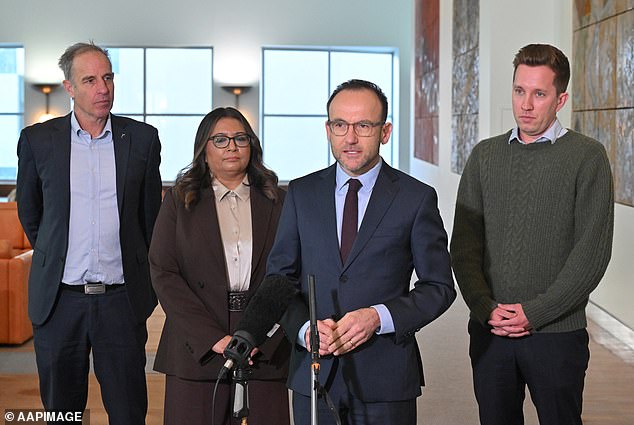The Greens are targeting a list of big Australian companies for new profit taxes if Labor needs the minority party’s support to govern after the next election.
Greens leader Adam Bandt will demand his new taxes on mining companies, big banks and retailers become law as the price of ensuring supply to a minority Labour government in the event of a hung parliament after the next election.
The bailout demands create a nightmare scenario for both businesses and the Australian economy. But Labor insiders say the biggest nightmare is reserved for the impact the measure could have on Labor’s chances at the next election.
Anthony Albanese’s government currently has a very narrow majority and opinion polls suggest it will not be able to hold on to it after the next election, which is not due before May next year. The Prime Minister has said privately that he expects Labor to be reduced to a minority government after the next election.
The nightmare of this new scenario created by the Greens is the damaging impact such a radical policy change would have on the economy if it were ever implemented, and of course the chances of that happening increase if Labour is re-elected.
Labour must now decide how to manage the new approach adopted by the Greens politically, so that it does not reduce its chances of re-election.
If he rejects the minor party’s initiative outright, he risks appearing to ideologically left-wing voters as a pale imitation of the Greens.
If Labour shows any sympathy for the Greens’ agenda, it will lose its political centre, not to mention that it will be too risky for swing voters in the mainstream electorate to support.
Pulling the strings in Labour: Greens demand higher taxes as price of supporting a Labour government

Greens leader Adam Bandt (pictured) will not support a minority Labour government without political concessions
If Team Albo tries to position itself on the right to protect itself from criticism, it will be in bed with the Greens after the next election; it will probably only look like a pale imitation of the Liberal Party to ideologically right-leaning voters.
Although the Prime Minister will probably deny that he will ever give in to the Greens’ demands, Australians know that Labor does deals with the Greens when election results are close.
It did so at federal level in 2010 and has done so regularly in Tasmania after state elections. In Tasmania, the Greens and Labor have governed in coalition at regular intervals in recent decades, with some Greens MPs even serving as ministers.
Brandt may want to extract similar concessions from a minority Albanian government if parliament fails to reach a deal, so that Green ministers in a coalition government with Labour can implement policies that the minority party supports.
The challenges facing Labour following the Greens’ radical new policy announcement are therefore many and varied.
Voters in Labor-held inner-city seats will be drawn to the policy script being advocated by the Greens, which puts Labor at risk of losing more seats to the minority party on its left flank in inner-city areas of Melbourne, Sydney and Brisbane.
Labor will also face criticism from the Coalition, which argues that voting for it carries greater risks now than before. Peter Dutton will argue that Labor could implement policies after a close election that it refuses to support in the run-up to the election once it becomes dependent on the Greens for its political survival.

Anthony Albanese (pictured) will be beholden to the Greens’ radical political agenda if he loses his majority at the next election.
This is expected to become a key election issue for the Coalition and dominate its political advertising.
Remember, Albanese has experience when it comes to saying one thing before an election and doing something very different after it. Labor backtracked on its promises about superannuation and the third-stage tax cut it made ahead of the 2022 election.
Treasurer Jim Chalmers recently described the broken promise of stage three tax cuts as his “proudest moment” in politics. When a politician identifies a broken promise as their proudest moment, voters are entitled to lose confidence in what they might promise to do or not do in the future. Their word is no longer their commitment.
It is therefore no exaggeration for undecided voters to now assume that supporting Labour risks empowering the Greens and their radical new political agenda, given the new strategy Bandt is embarking on.
The Albanese government has been seriously shaken by Bandt’s move, which is likely to prove electorally successful for the minority party which (unlike Labour) only needs to appeal to a limited voter base to achieve its electoral objectives.
It is hard to find a coherent way out of this political curveball that has been thrown at Albo. Traditional left-wing voters are already bemoaning Labour’s failures on everything from Gaza to cutting emissions and defending higher education and social security funding.
However, when it comes to debates within the dominant party, Labor is struggling to maintain the centre of debate on issues such as the economy and national security. The Coalition points to failures in areas such as housing and immigration, and even claims some ministerial posts in the recent reshuffle.
Solutions that might satisfy undecided voters are causing disillusionment among Labour’s left-wing base, leading them to adopt the Green path when election time comes.
Fears in all of these strategic areas are growing within the senior levels of the Task Force.
The position of power that the Greens now adopt in the event that the next parliament is not elected puts Albo and Labour in a very enviable position.


